Vladimir Sharov was a Russian writer who was deeply interested in the legacy of Russia’s Communist history. His nine novels focus on various aspects of this history: the communist schisms, Bolshevism, Stalin’s Terror, and the USSR’s collapse, and often mixes or juxtaposes ideas from Communism and religion. Russia’s Soviet history was deeply personal to Sharov, who once wrote, “I could never forgive Soviet power for the millions who were shot or died in the camps, including two thirds of my own family.” Although he often took liberties with his “retelling” of the dark sides of Russia’s Soviet past, his works captured the emotional truths of the twentieth century.
Sharov was born in April, 1952 in Moscow, Russia. His mother, Anna, was a stay at home parent that tended to the family. His father, Alexander, was a well-known Soviet science fiction writer and children’s novelist.
In his youth, Sharov attended secondary school at the State Physics and Mathematics Lyceum of Moscow. Shortly after he graduated he began to attend Voronezh State University, where he studied history. In 1984, Sharov defended his thesis on the historiography of the Time of Troubles and Ivan the Terrible’s secret police, the Oprichnina. This police force used mass repressions, public executions, and the confiscation of land and property from Russian aristocrats. Sharov’s historical interests would further echo through his literature.
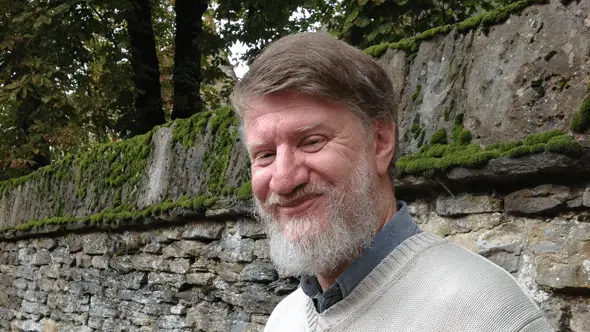
In 1991, Sharov transition from studying history to writing historical fiction with his debut novel, A Trace in the Footprint: The Chronicle of One Kind in Thoughts, Comments, and Key Dates, which was published in the Yekaterinburg-based literary, artistic, and journalistic magazine, Ural. A Trace in the Footprint is a family saga set in twentieth century Russia. The plot follows a character named Fyodor who begins to research the genealogy of his adoptive father, Golosov. This leads to the unraveling of a whole century of family history beginning with his great-grandfather. Fyodor soon discovers that his family’s history is inextricably linked to that of the Socialist Revolutionaries, the political party that would eventually split into the Bolsheviks and Mensheviks. The novel depicts the changes in Fyodor’s family after being forced to adapt to the political and social changes that took place after the 1917 Bolshevik Revolution. Critically, the novel was praised for its classical narration reminiscent of Tolstoy’s realism. Once published in hard copy in 1992, the book sold over 25,000 copies in Russia.
Sharov’s A Trace in the Footprint has been compared by critics to the 1967 novel One Hundred Years of Solitude by Gabriel Marquez. Where Sharov’s story follows a Russian family, Marquez’s novel tells a multigenerational story of the Buendia family from Colombia. Similarly to Sharov, Marquez’s story plunges into the true events that occurred but places a fictional family at the forefront. The result of the novels is the same, although fictional, the novels recreate the emotions felt in times of historical turmoil. Both stories accurately depict a family struggling to keep up with the socio-political changes that happen around them.
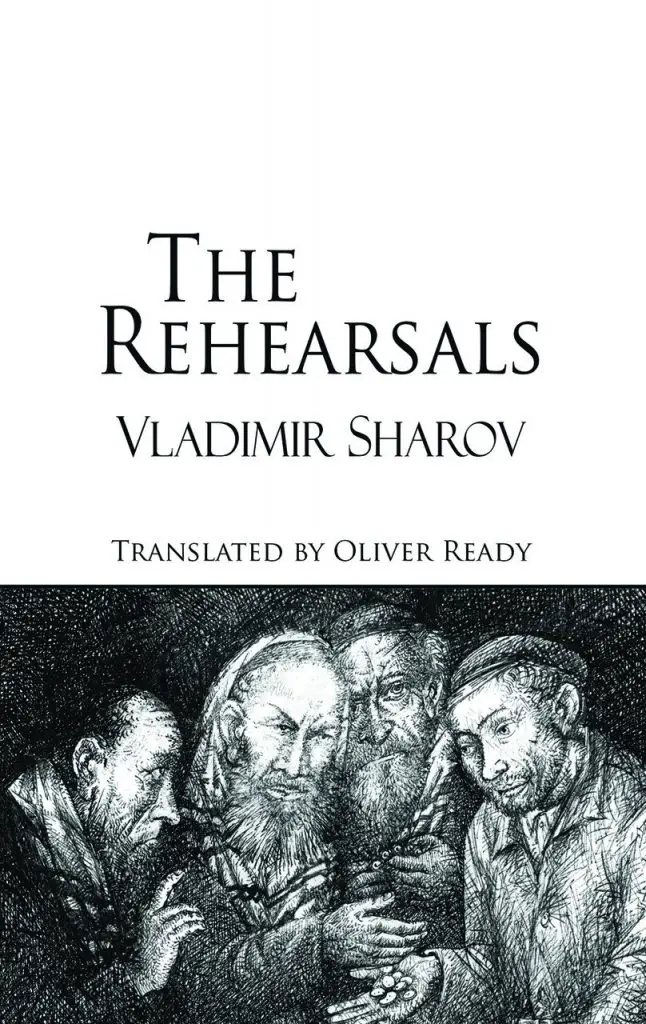
In 1992 Sharov continued his analysis of Soviet history with the release of his second novel, Rehearsals. In this novel, Sharov’s main character is an up-and-coming medieval historian, who is given old manuscripts by a mysterious figure. In these manuscripts, he uncovers the diaries of a seventeenth century Frenchman, Jacques de Sertan, who is writing a play about the life of Christ. The novel then follows a small Russian community that acts out Sertan’s work. The community is followed from the Old Believer schism of 1666 to the beginning of the Soviet period and the horrors of the Gulag, where the small community, once blooming with life, turns into a labor camp. In Russia the novel was praised for its in-depth look at the repercussions of communism on a rural community. The novel was also well received by readers and has sold over 30,000 copies in Russia alone.
In 1993, Sharov released his third novel, Before and During as a serial in the magazine New World before publishing a hard copy the same year. The novel is narrated by Alyosha, a middle aged man living in Soviet Russia. For most of the novel, Alyosha is voluntarily institutionalized in the Korsakov Psychiatric Institute because of his mental blackouts and dementia. Throughout Before and During Alyosha is depicted as writing a “Memorial Book,” that he intends to record the lives of the people he has known. In the ward the project takes on new meaning as he begins to write the stories of fellow patients, who are either “Old Bolsheviks or former Party bosses” and later realizing that his subjects “needed to be loved and saved, not analyzed.”
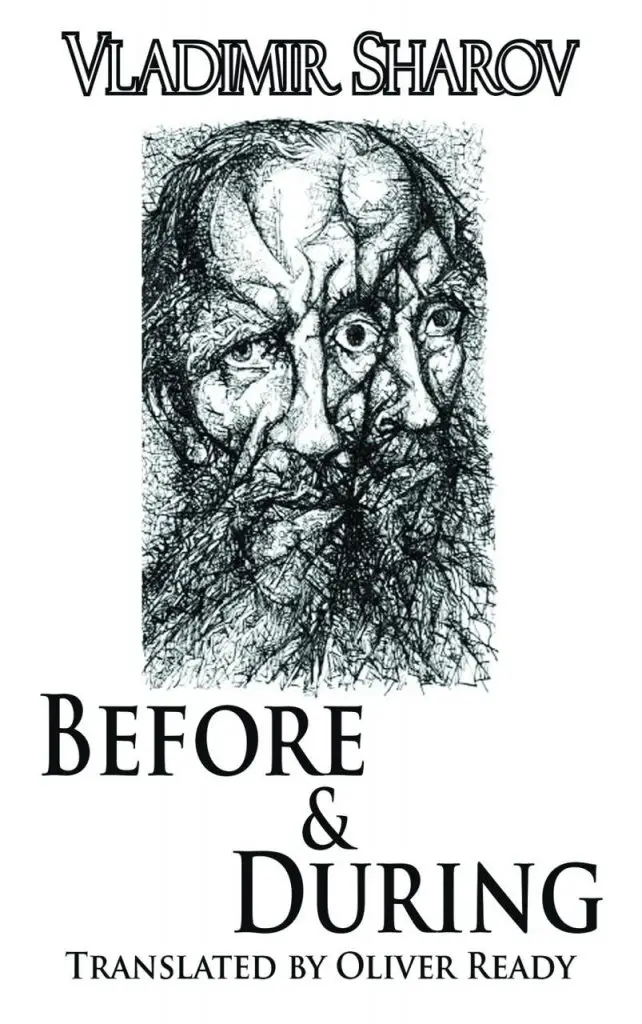
As Before and During progresses it focuses in on the story of Germaine de Staël, a woman who is known to have actually travelled to Russia but did not stay for a long period of time. In Sharov’s fictional account, however, her stay is extended and she resides in Russia and has various children with multiple men. Soon she meets Vissarion Ignatashvili by whom she has a child named Josef. As Vissarion is married to someone else, the child takes his mother’s name – in Russian Staël is written as Stal and the in suffix can be added as a diminutive. Thus, the child is then known as Josef Stalin. In the novel Staël raised Stalin as a Christian, and Sharov works to link Christianity with the motivation behind Stalin’s Terror.
The publication of Before and During was met with controversy in the Russian literary world and the editors of New World, the magazine that it was first published in, eventually spoke out against Sharov. S. Kostyko and I. Rodnyanskaya, two well-known literary critics and members of New World’s editorial board, rejected the philosophy and poetics of Sharov’s prose that they believed took too many liberties with historical facts. Readers and critics found Sharov’s link between Orthodox Christianity and Bolshevism controversial. This is particularly interesting as the line of study is fairly well established in western explorations of Soviet history, as Stalin was actually studying to become a priest before he became a revolutionary and a dictator. Despite the controversy surrounding the novel, when it was released in hard copy the book sold over 25,000 copies in Russia.
In 1995 Sharov’s fourth novel, Do I Have No Regrets, was published. The novel is a tale of a family whose path is closely intertwined with the fate of Russia in the twentieth century. Similar to A Trace in the Footprint, the novel follows the changing atmosphere in Russia during periods of inner turmoil – the Civil War, collectivization, the Great Patriotic War, and the dissolution of the USSR. At the forefront of Do I Have No Regrets is a family trying to find their place between a series of social and political upheavals. Critics were largely satisfied with the great attention Sharov paid to historical detail in this work. In Russia, the novel sold over 20,000 copies.
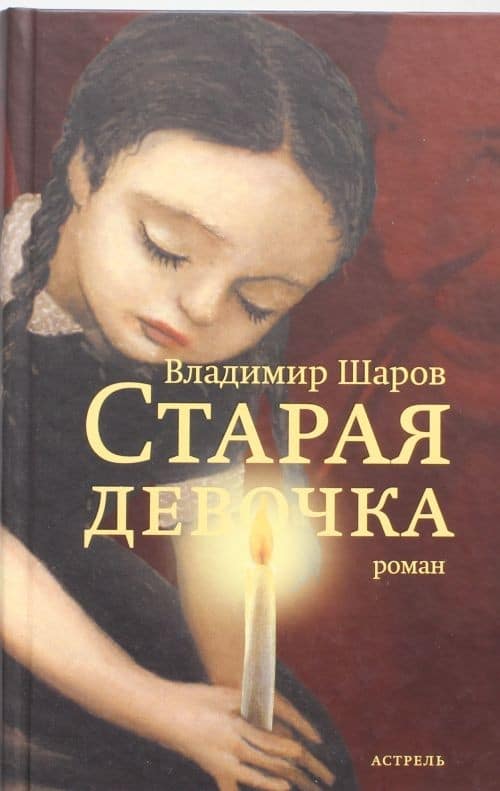
Sharov followed this with The Old Girl in 1998. The novel depicts the tragic life of Vera Radostina, a communist party member who was married a high ranking commissar in Stalin’s government. Her life changes, however, after her husband is labelled an enemy of the people. She then loses everything – her husband is shot, her children pass away, and her house is taken from her. In this period of sorrow she decides to begin to relive her life by reading all of her old diary entries. Critically, the novel was well-received by reviewers who took an interest in the existential questions brought up by the novel, such as: is it possible to turn back time and is there an end to suffering? Although the questions are well posed and explored in the novel, Sharov does not offer answers. In Russia, The Old Girl has sold a total of 15,000 copies.
In 2002, Sharov published Raising Lazarus. Through a patchwork of letters and second hand memoirs, the novel follows the lives of two brothers in the first half of the twentieth century. One of the brothers, Fyodor, is a bishop-turned-religious-sectarian. The other brother, Nikolai, is obsessed with the idea of reuniting Russian society in the years after the Russian Civil War. As Raising Lazarus progresses, Nikolai becomes interested in esoteric doctrines that promise to transcend ideological conflicts. The reader soon learns through letters written by Nikolai, that he believes that Christ must return to Earth for salvation to be bestowed on Russia and we see a blending of the Christian and Bolshevik expectations for an “end of history.” Nikolai then begins to believe that only truly terrible human conditions can cause the arrival of the Messiah. This time, Sharov’s mixing of religious and communist beliefs was praised by critics because of Sharov’s clever use of symbolism. Raising Lazarus has sold over 10,000 copies in Russian alone.
In 2008, Sharov released his seventh novel, Be Like Children. The novel is set in the aftermath of the 1917 Revolution, and using the evangelical parable “be like children,” Sharov depicts a retelling of the last years of Lenin’s life where he experienced a religious conversion and plotted a children’s crusade to the Holy Land. Critical reception was divided on this novel because although the parable “be like children” linked characters, sometimes the multitude of characters made the novel hard to comprehend. Despite this, this novel also sold over 10,000 copies in Russia.
In 2013 Sharov released his most celebrated work, Return to Egypt. The novel depicts a Soviet agronomist by the name of Nikolai Gogol, who is a descendent of the great Russia writer by the same name. Throughout the novel, Nikolai attempts to write a sequel to the classic novel Dead Souls. The book, however, is not about Gogol; it instead follows the journey of Soviet generations whose lives are inextricably linked to the Bible’s Book of Exodus, hence the novel’s title. The novel has sold over 45,000 copies of books in Russian alone. In 2014, Sharov was awarded the Russian Booker and the Big Book award for the novel. Critically, the novel was a huge success as Sharov was praised for his unique and poetic plot. For example, according to the literary critic Natalia Kurchatova: “the author works at the junction of histography and religious-mystical perception of reality” to create a deeply complex and reflexive novel.
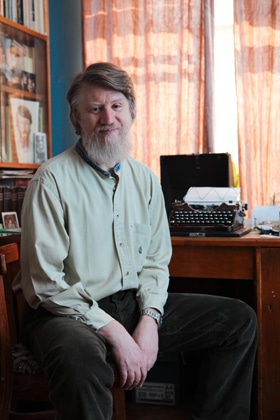
In 2014, Sharov worked with Oliver Ready to publish Before and During in the West to much critical acclaim. Anna Aslanyan for The Independent noted: “if Russian history is indeed a commentary to the Bible, then Before and During is an audacious attempt to shine a mystical light on it, an unusual take on the twentieth century’s apocalypse that leaves the reader to look for their own explications.” Furthermore, Caryl Emerson for the Times Literary Supplement noted that the novel depicts “historical reality, in all its irreversible awfulness, is for a moment scrambled, eroticized, permitted impossible juxtapositions and illuminated by hilarious monologues of the dead. Sharov’s characters do not make eye contact, but rather talk into the cosmic void.” In the West, his novel Before and During has sold over 40,000 copies.
After the critical success of Before and During in translation, Sharov once again worked with Oliver Ready to translate Rehearsals into English. It was published in 2018 and was generally praised by critics for the brilliant use of language. Rachel Polonsky for The New York Review of Books wrote: “the clarity and directness of Sharov’s prose – wonderfully rendered by Oliver Ready – are disconcerting, almost hallucinatory. His writing is at times funny, at times so piercingly moving, so brimful of unassuaged sorrow, that it causes a double-take. ‘How did I get here?’ Is a question his reader will likely ask again and again.” In the West, this novel has sold over 50,000 copies.
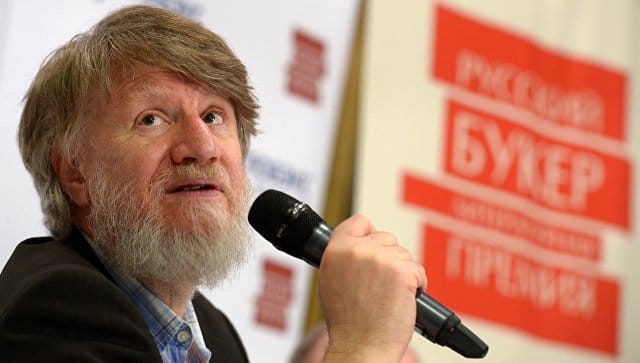
In 2018, Sharov released his ninth and final novel, The Kingdom of Agamemnon. The novel’s title refers to the Greek tragedy of Agamemnon who, after his return from Troy, was killed by Aegisthus, the lover of his wife, Clytemnestra. The King of Agamemnon follows Nikolai Zhestovsky, a researcher and philosopher, whose modern life in the twentieth century, including current-day Russia, begins to mimic Agamemnon’s ancient tragedy. Critics praised Sharov’s last work for its profound philosophical reflections and unexpected historical parallels. The novel sold just under 10,000 copies in Russia.
On the 17 of August, 2018, Sharov passed away after a long battle with terminal cancer at the age of 66. Although his literature was successful critically, literary scholar Muireann Maguire accurately described him as “possibly the most important Russian novelist you may never have heard of.” Since this statement, however, he has had two books translated into English – Before and During and The Rehearsals. His relative anonymity in the Russian literary world can perhaps be attributed to his old-school style as a writer. Unlike many who produce novels within a year, his literature took time. He would only publish a novel every three to five years. The result was a highly personal look into the emotions felt by Soviet citizens during periods of social and political turmoil. His works resonated with critics, Russian and Western readers, because his literature shines a light on the dark side of Russia’s Soviet past. It seems likely, given the outpouring of goodwill and remorse expressed by both the Russian and Western literary worlds on the occasion of his death, that his literature will only grow in importance in both worlds.







